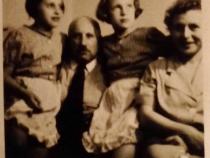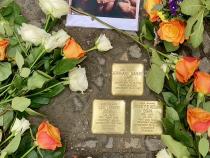Rosette Recha was born on June 11th, 1903 in Wüstensachsen (Hessen/Nassau), near Fulda. Her parents were Bernhard Baruch Lump (born on 29th, February 1872 in Wüstensachsen) and Regina Rebecka Kahn, who was born in Bad Homburg on 27th, December 1875.
Bernhard, Rosette's father, was the son of the cattle dealer Joel Lump and his wife Hanna, née Höflein.
Bernhard also became a cattle dealer.
Rosette's family was very large; she was the second of eleven siblings: Ludwig (May 24th, 1902), Max (April 8th, 1905), Hermann (December 23rd, 1906), Tilly (May 7th, 1908), Lea "Berta" (February 14th, 1910), Selma Julchen (May 9th, 1912), Leopold (July 8th, 1914), Julius (February 3rd, 1916), and the twins Henny and Hanna (October 30th, 1918). In 1920, the family was living in Fulda at Petersbergerstrasse 23.
On November 5th, 1926, Rosette married Leo Lesser Cohn who was born in Gollub (then in the Prussian province, now Poland) on November 5th, 1892. He was a soldier in World War I and served in the artillery for the entire duration of the war.
They had two daughters, Dorothea Doris Hulda, born February 10th, 1928 in Hameln, and Hanna, born May 9th, 1929 in Berlin-Heinersdorf.
Leo was a pharmacist. In 1928, the couple had moved to Berlin and opened a drugstore at Kronprinzenstraße 12 in Berlin-Heinersdorf. Rosette also trained as a druggist and worked in the store with her husband. The family lived in an apartment above the drugstore. Heinersdorf was still very rural at that time and seemed like a village near Berlin. (The street was renamed Romain Rolland-Straße in 1951, the house where the drugstore was located no longer exists).
After the Nazis came to power, sales dropped significantly because many former customers avoided the Jewish store. In 1937, they gave up the business.
Whether the drugstore was aryanized or whether they were forced to liquidate the business can no longer be ascertained. At that time, about 60% of Jewish businesses were forcibly closed.
Nevertheless, the couple operated two more drugstores, in Kopenhagener Straße and Barbarossastraße. Both were looted and destroyed during the Pogrom Night in November 1938.
As of January 1939, all businesses owned by Jews were forcibly closed and Jews were forbidden to practice practically any profession.
Leopold Lump, a younger brother of Rosette, was also a druggist and ran a store on Prenzlauer Strasse (today Karl Liebknecht-Strasse).
In 1938, this drugstore was also demolished during the November pogrom. Leopold fled to Belgium and France in 1939, was arrested in March 1943 and deported to Majdanek via Gurs, where he was murdered.
The family had moved to Berchtesgadener Straße 35 in 1938 into the rear building, 2nd floor. The apartment had 3 rooms. On May 23rd, 1939, Rosette's mother died, whereupon the family brought Rosette's father, Bernhard Lump, to live with them in Berlin.
Rosette had to do forced labor at Siemens-Schuckert in Siemensstadt. She received 25 Reichsmark a week, as she entered it in the declaration of assets shortly before her deportation.
Presumably Leo also had to do forced labor as a chemist in an armament’s factory.
On August 1st, 1939, the parents sent the two daughters to England on the last of the Kinder transports.
Dorothea recalled that her parents also had plans to emigrate. When the family was still together, they all took Spanish lessons because they planned to emigrate to South America, but this possibility fell through.
Rosette's father, Bernhard Lump, was deported to Terezin on December 16th, 1942, where he was murdered on May 13th, 1943.
At the time of the census in May 1939, 43 Jewish people lived in the house at Berchtesgadener Straße 35, most of whom had already been deported or arrested by the beginning of 1943; three families had emigrated.
On March 1st, 1943, Leo Cohn went into hiding and shortly before that Rosette, namely in January 1943 - that is how they recorded it in their respective declarations of assets.
Probably their own deportation was imminent:
Accordingly, there is a letter to the Gestapo dated May 18th, 1943, that Leo Cohn should have been "evacuated" on February 27th. However, he was not listed in the file of deported Jews. They asked to be informed whether the deportation had taken place.
Rosette and Leo Cohn were living in hiding with acquaintances in Berlin. They were probably betrayed to the Gestapo by a Jew who wanted to avoid his own deportation. This is how their daughter Dorothea told it in an interview she gave to the United States Holocaust Memorial Museum on April 27th, 2017. She was 89 years old at the time. Dorothea: "They almost made it. They were hidden by non-Jews. Another Jew reported the hiding, and everyone was arrested, including those who had hidden the parents."
Rosette was arrested at Otto Weidt's institution for the blind on October 15t, 1943. She had probably come into contact with Otto Weidt because female residents of the house at Berchtesgadener Straße 35 had taken shelter in Otto Weidt's workshop. Alice Licht had worked in the workshop as a secretary since 1941. Alice was hidden with her parents in February 1943 in a storage room that Otto Weidt had rented. Eight months later, the Gestapo learned of the hiding place. The family was deported to the Terezin ghetto in November 1943 and to Auschwitz-Birkenau six months later.
Also the twin sisters Anneliese and Marianne Bernstein lived in Berchtesgadener Straße 35 and were also hidden through the mediation of Otto Weidt. They survived the end of the war.
The order for the confiscation of her property was delivered to Rosette on October 27th, 1943, to the Große Hamburger Straße collection camp.
Two days later, on October 29th, 1943, Rosette Cohn was deported to Auschwitz with the 45th Osttransport along with 49 other people and murdered there.
Leo Cohn was not arrested until nine months later. In the declaration of assets that he filled out on August 10th, 1944, the day of the deportation, he wrote that he had lived in Berchtesgadener Straße until March 1st, 1943, when he began living "illegally". Up to this point, he probably had to do forced labor - just like Rosette - but he entered nothing about this in the declaration of assets. (A family friend who had visited the couple later told this to the daughter Dorothea). The order for the confiscation of his property had already been issued on 1.5.44; he received it on 10th of August at the Schulstraße collection center. (At the beginning of March 1944, the Große Hamburger Strasse camp had moved to the former pathology department of the Jewish Hospital on Schulstrasse in Berlin's district Wedding).
Leo was deported to Auschwitz on August 10th, 1944, on one of the last deportation trains. It was the so-called 56th Osttransport with only 38 persons.
In response to the question in the declaration of assets "Which family members have already emigrated? Where to?" Leo wrote: "2 children, England" and Rosette wrote: "Dori Sara C. and Hanna Sara C.: USA. (Possibly Rosette thought the daughters were in danger if Germany succeeded in searching for the children in England and therefore wrote that they were in the USA. (She did (however) enter the second name "Sara," ordered by the Nazis, for both herself and the daughters).
Both Rosette and Leo did not enter any property on the sixteen pages of the declaration of assets - neither furniture, nor clothing, and certainly no assets. The apartment in Berchtesgadener Straße was inspected twice by bailiffs (on 25.3.44 and 30.6.44). Both bailiffs confirmed that the apartment was empty except for a worthless bed. This bed was given to the caretaker Schulz "free of charge".
There were still two bank balances of the couple:
On 15.2.44, the Reich Association of Jews had to transfer 398.27 RM, which had belonged to Rosette Cohn, to the tax office.
From the Dresdner Bank, an amount of 1,429 RM from Leo Cohn's account was transferred to the tax office on 21st of June 1943.
Questions remain unanswered: Where and with whom did the couple live in hiding (and who betrayed them later)? Probably they were hidden by different people. Perhaps Rosette was hidden by friends of Otto Weidt, in whose workshop she was also arrested by the Gestapo. Leo was arrested nine months later. He was probably even in a hiding place that Rosette did not even know about, otherwise she would have had to reveal it to the Gestapo (under torture) when she was arrested.
Why was their apartment in Berchtesgadener Straße completely empty? They could not take anything into their hiding place - certainly not any furniture. They probably couldn't have sold it either, because then their intention to escape would have come to light.
The daughters Dorothea and Hanna, 11 and 10 years old, had been taken to the train station by their parents on August 1st, 1939. The family hoped to be reunited soon. The children in particular had no idea that they would never see their parents again. The last letter they received was from their father, written on March 10th, 1943, when he and Rosette were already living in hiding in Berlin. The letter was forwarded to the children by the German Red Cross. In it, Leo wrote to his "Beloved Dolls!" and he ended with a wish to be reunited with them soon.
When London was bombed by the Nazis, the school where Hanna and Dorothea went was closed and all the children were sent to the countryside to stay with families. This meant that the English children were also separated from their parents, so the sisters felt they were treated equally to the English children. They lived with an elderly couple, and Dorothea kept them in loving memory. Later, the sisters moved in with a German friend of their parents who lived in Staines, near London.
Dorothea then moved in with the family of a school friend, and the younger Hanna lived with another family and attended the North Western Polytechnic School until emigrating to the United States in 1945. This institution had been established to give young men and women a comprehensive practical and scientific education.
One of her mother's sisters arranged for Dorothea and Hanna to come to the United States in 1946. This aunt, Lea, called Berta, had - like almost all of Rosette's siblings - fled to Shanghai and moved from there to the USA. Dorothea loved her very much - Berta and her husband Hans were like parents to the girls.
They were picked up from the ship by their uncles and aunts, who lived in New York, and lived in a two-family house in Brooklyn.
Dorothea - now Doris - graduated from the New York School of Interior Decoration as early as January 1948. She married (in second marriage) Stanford Fingerhood in 1955 and had their son Steven in 1958. Dorothea passed away in December 2020.
Hanna attended Drake Business School and received a secretarial certificate in June 1947. She married Erich Jawetz 1950. They had two daughters, Linda, born in 1956, and Karen in 1958. Hanna died in June 2014.




